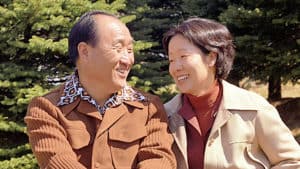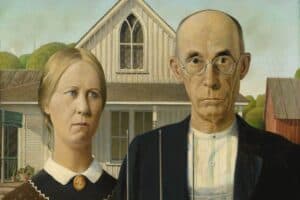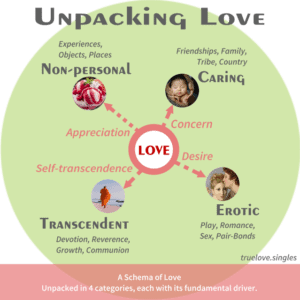Now, liking and similarity and opposites by themselves do not make for a good checklist. But I think that any approach to pair-bonding and checklists needs to take the notions of liking, similarities, and opposites into account − and in that temporal order.
First, let’s talk a bit more about what liking may be. Then, we’ll talk about what similarities and opposites may be in terms of comfort and fascination.
Liking

As a defining feature of its social network, Facebook made a Like button famous. Clicking the Like button implies no obligation or commitment whatsoever, it is just that: a light-hearted expression of affirming a positive connection − all without any necessary ulterior motives.
Some say that liking and love are the opposite ends on a scale of intensity. We do like all kinds of things and people, all without much intensity. Love, on the other hand, is intense.
And so, we like some people more than others. Liking is sometimes an unconscious response to a first impression, at other times a show of approval in an attempt at making or renewing a connection. Our liking can surely be conditioned by others and cultural norms, like in the case of us being compelled to like what our peers like or close kin require.
Yet, there is also something visceral about our liking, whereas we either like or not rather independently of being compelled by others. In that case, a visceral liking or disliking is, after the fact, really hard to alter. It matters when it comes to second impressions of another, as first impressions may end up only being skin-deep at times.
“We can’t tell ourselves whom to fall in love with.”
Empirical philosopher David Hume
Similarities provide for Comfort
Similarities are comforting. As people interested in self-preservation, we do look for natural, easy-to-come-by agreements and approvals in our social lives, and similarities may lend themselves to being good common ground. Friendships and soulmate relations are often established around common interests.

What probably united the Rev. and Mrs. Moon was their shared motto: “Living for the sake of others.” Obviously, they also must have been fascinated by each other as respective members of the opposite sex. They had and raised 14 children together.
Not all that shines is gold. While similarities provide for comfort, similarities alone also provide for eventual boredom. Boredom, a virus able to afflict both men and women, is one of the top causes of infidelities. Remember that an ounce of prevention is better than a pound of cure?

Strong common ground is found in religious and civic convictions. Jews marry Jews, Catholics marry Catholics, liberals marry liberals, conservatives marry conservatives, rich marry rich, and poor marry poor, that sort of thing. Others believe that common ground can be found based on similar character traits or personality types. Obviously, these aforementioned notions are stereotypical. Plenty of people break these molds, that is what ‘falling in love’ sometimes affects. Needless to say, interracial pair bonds and marriages are on the rise.
There are many common grounds to be found, grounds of all kinds. The one vital example I like to promote is related to the narrative of Unpacking Love from our front page. Non-personal Love of all Things is obviously not solid common ground, but Love as Care is for many. For others yet it is Love as the Erotic, or more often a certain order or combination of all four clusters. Be mindful that some common grounds are more stable or permanent than others.

It seems to make sense to take note of one’s own standing within all dimensions of love first, and then learn if the other is near or too far in the same regard for any common ground to emerge.
Opposites provide for Fascination
Yet bonded relationships need not become boring. Opposites help in that they aid the enchantment with each other and generally enlarge life for both. So, be eager to enchant and surrender yourself to the other. Amorous love is not only erotic but also playful love. The delights of amorous intimacy − and not mere sex − are what make life worth living.


Mark Anthony and Cleopatra were apparently fascinated by each other. Despite this, their bond did not end well as the common ground of empire building was politically unstable and shifting under their feet. Do not build your house on quicksand.
All opposites attract? Some opposites make people repel each other instead of fascinating and uniting them. Many opposites are insurmountable, no matter any personal goodwill. Don’t be fooled by others’ compelling advice. Too often, kin and peers speak out of self-interest more than anything else. There’s no shame in breaking up when staying would be hurtful.

Some believe that similarities and opposites can be identified and evaluated in terms of their compatibilities based on character traits and/or personality types. That may very well be so, but who is an expert in that? And who can tell which character trait or personality type goes well together with another or not? Two people may bond on several levels, channels, or domains that anyone, especially a quaint one, can be so powerful as to make prominent others rather irrelevant.
Again, the same taxonomy used in Unpacking Love may serve as one of perhaps many frameworks or models to evaluate opposites. If one of the partners is really into devotion to a deity and takes his or her daily clues from revelation, and the other is into playful sex during day and night and to no end, how is that going to work out in the long run?
Opposites attract, they say. Sure, they may fascinate for a while, maybe even for a long while, but for the span of a shared life?
Now, the male / female dichotomy seems to have the best record in human history. Children do well in that scenario. But I have encountered heterosexual couples where one partner seems to be dying of boredom with the other. At other times both seem to be afflicted with that condition, as in the case of the couple falling asleep together in a movie theatre.
Opposites matter as some may empower and others diminish a promising partner’s self.
Consider how liking, similarities, and opposites play out in relationship dynamics and see if you can recognize yourself or anyone you know in any of them.
A great little book to buy and read now would be 101 Questions to Ask Before You Get Engaged by H. Norman Wright, 2004, Harvest House Publishers. The book’s content makes for a great checklist as is not academic, preachy, or anything that could annoy a sincere reader, religious or not. It is just to the point that its title makes. Books convey personal content more extensively than introductory websites like truelove.singles can do.
Consider the framework of the three steps of how people may select a mate: liking, similarities, and opposites; and follow that up with going over the 101 Questions once a promising single is in sight. It is very possible for anyone to craft their own comprehensive checklist. That is part and parcel of the ‘labor of love’ effort.